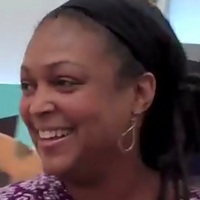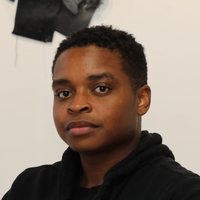As told to Max Freedman, 2808 words.
Tags: Music, Independence, Process, Success, Collaboration, Politics, Money.
On harnessing the communities around you
Musicians Meg Remy (U.S. Girls) and Max Turnbull (Badge Époque Ensemble) discuss the fusion of creativity and life, the power of collaborations, and how to reframe success outside capitalism.I have to imagine you two have learned quite a lot from each other over the years.
Meg: Yes.
Max: Yes. We call it the IP factory, which can contribute to different aspects of creating albums.
Meg: But more than that, I think we’ve learned life things. We’ve spent way more time together in life than in music.
You two have moved through a bunch of styles in your music, so I’m curious about the value of exploration and change in your creativity and life.
Meg: When making work and then being partnered, for either relationship to not go stale, experimentation, exploring, and searching are necessary. On the creative side, I’m lucky to live with Max, who’s so voracious about searching for music that I don’t have to search for it anymore, because Max is always bringing new stuff into the house. I’ve found out about tons of music in a very organic way. It enters my home through Max’s wandering and relentless searching for music, which has helped me creatively. I’ve done that with Max a bit in terms of books and ideas I’m getting through my reading, and I’m getting that from Max, too.
In terms of personal exploration, I’ve had Max as a support to do that in my own life, which makes it easier and less scary. He’s a sounding board as I’m doing different things creatively or trying to work on things with myself, someone that can tell me, “Yeah, this seems like you,” or “This doesn’t seem like you,” or “You could do better,” or “Give yourself a break.” It’s nice to have that built-in support.
Max: I think our personal life is creative as well, but artistically versus our private lives, I characterize those as different. There’s exploration in both, but on the professional, artistic front, I characterize it more as restlessness.
There’s something about my desire to make music that never feels entirely settled. I get a lot of joy from my pursuit of music, but there’s almost an equal measure of frustration and never feeling totally settled in one place. Perhaps that’s good for the results creatively, but having more stability in our private life grounds me and allows me to pursue this restless, creative wondering.
That’s not to say the stability has been static. There’s been a lot of movement with it, but we’re operating from a place of, at its base, a mutual acceptance of one another that can be very powerful. It also takes the form of calling each other on our B.S., which is part of the exploration.
I’m just curious to try and refine my consciousness through this relationship to a point where I feel fully secure in myself, and I’m hoping that, eventually, that security will translate into more security on the artistic front. I characterize that as something restless, so not without its own curiosities.
Both your bands seem like big communities, but it also sounds like there’s a little creative community in your home. I’d love to hear you talk about the value of community.
Meg: Community has taken on a new meaning since having kids. We had two kids, and then we had all our friends gather around us and bring us meals every day for two months. We needed to eat, and we were in such new waters. It was so hard to keep our heads above water that there was no time to even think about food because, all of a sudden, you had these two creatures that needed you every moment and you were figuring out who you were in this new environment. Realizing we had that community around us, which was pretty much all people from music, helped.
[In our home], Max and I are always just talking about things. We’re always bouncing things off each other, but then, often, to carry them out, we have to step into our community and ask for help. The home space is for making the initial plan so you can bring it into the community and share it.
Speaking about life, creativity, the professional world, those are all completely intertwined and then totally separate. When we’re talking about creativity, I wish it was completely separate from the professional realm or thinking about how to make a living. Part of the exploration we’ve done together is how to creatively navigate an industry we have a lot of issues with in a way we can live with. I feel like that’s seeped out into how we interact with our community and collaborate with other people. It mirrors that when we go out and do bigger work.
Max: The longer you collaborate in the community, and if you treat those people well and the work is engaging, the more the pool of collaborators refines itself. Now, we have this team of people we collaborate with across projects that are just so excellent, and they’re all fulfilling things we couldn’t do ourselves, not least of which is bringing a different flavor or personality to things.
I think of U.S. Girls and Slim Twig [previously] and Badge [Époque Ensemble as] long-form projects. It’s not really, one album is the project. It’s across albums, and it’s across live shows, and it’s imaginative exercises that start with a singular idea that begins in a brain and then moves outward, and we share that idea with one another, and then it becomes larger and incorporates more and more people. Our home is the nest where that act of imagination can begin.
A big part of collaboration right now is beating back our expectations about how we should be interacting with the industry and how this music should be “performing” in those contexts. A huge part of the labor right now is trying to be a strength for one another to [reckon with] our distinct misperceptions about how we fit into that economy. And then, just trying to be that support, so that at least the genesis of the creative thing happens in a space that feels removed from the economic aspects. That’s a huge challenge that I feel grateful Meg and I take on together.
Over the years, how have you known when somebody will work well as a collaborator?
Meg: Sometimes, you think they’re going to be great, and they are great. Collaborators can be [like] relationships. You meet someone, you fall in love. It’s so intense right away. You’re spending every minute together, and then something just goes sour, and that’s done and you break up, and that can happen with collaborators. Collaborators can work well for a short period of time. It can be longer.
For me, more so than someone being crazy proficient or some virtuoso, I want them to be gentle, kind, and able to listen and give ideas and be okay with the fact that I don’t read music, and I come at music from a different, more self-taught, feelings-based space. For me, someone who just wants to be in that space while we’re working is important. It means sharing and not holding back.
Especially for the live setting, when you’re doing something on stage together where you really have to let your guard down and go somewhere, there needs to be that support and trust with the people on the stage. It’s really hard to go for it on stage when you think someone in your band is judging you.
Max: This is a very dynamic, fluid notion, because among the primary qualities we’re looking for is someone who’s great to be around on a personal level. That has some bearing on how they’ll approach things musically. The best people elevate the work and are, as Meg said, gentle and kindhearted.
I tend to have a really difficult time ignoring when someone is elevating the project. But those people, if they’re not doing the other thing, they don’t tend to stick around as long, or the collaboration is engaged along the lines of work exclusively, as opposed to this more interpersonal level where you’re developing as individuals in a community alongside one another. Of course, it’s a mutual thing. It’s not just Meg and I deciding, “Ah, this person is a cast member.” That person has to really appreciate the work and enjoy being around us, too.
Meg: Sometimes, with collaborations just a couple hours long, you find someone who is a really good player, and they’re going to come track something, and then you have a fine time, and then they leave and it’s like, “Yeah, there was a collaboration, but that was more a mutual transaction than a collaboration.” For me, collaboration has an emotional meaning to it as well, whereas other ones would be more just transactional.
Max: We are trying to whittle down those transactional collaborations and find, perhaps to use the term crudely, ride-or-die bitches. That’s what we’re looking for—people who believe in the work and invest themselves in it and leave the experience feeling enriched rather than keeping themselves at a distance. You find that kind of collaborator only after years of doing something and having an intuition about someone and pursuing it.
Meg, you and I have talked explicitly in the past about how capitalism runs counter to pretty much everything artistic—
Max: Anything humane, honestly.
Meg: Yeah. It’s counter to life.
I agree. I want to hear about how you deal with the many moments in which capitalism counters your creative visions.
Max: One of the most obvious places is the discovery that there’s not actually an economic market that will sustain the vision I have for music. That has been a painful thing to discover and try to come to terms with.
The big consolation for me is that I live in a country with a robust granting system. I grew up with artist parents who had a good facility with writing grants, and I absorbed that by osmosis. A big part of my transition into making what I conceive of as my adult phase of work has been employing that facility to do grant writing, and trying to conceive of my work in artistic terms and contribute to a history of music that runs counter to capitalist notions…jazz music, for instance, or artistic forms of ensemble-based music. So just trying to embrace that and stop trying to chase some fantasy that I’m going to wake up and there’s going to be a very lucrative market for me.
Meg: What always counters capitalism is just continuing to make things in its face, and trying as much as possible to make things based on my ideas and how I’m feeling rather than how it will play out within the system, or whether this system will allow me to do it.
I haven’t been on a stage in over two years, but previously, it always felt counter to capitalism. You perform within a capitalist space, a venue, but the audience and the performers make another space within it that feels sacred, and performing feels like I’m part of a lineage that’s extremely old, older than capitalism. Performing from an emotional space, from a very physical space where I’m giving my whole body and trying to encourage the audience to do the same, feels very counter to capitalism.
Anytime we’ve played a show and people don’t have their phones out feels like you’ve beaten capitalism, because you’ve tricked the brain. All of our brains are so used to experiencing things through a device now. And if you’ve tricked that into shutting off, that feels like a win or doing something counter or dismantling it for a moment.
Max: With the phone stuff, people are often trying to capture something that can be valuable to them as some kind of cultural coin or something of, “Look at me by my association with this thing. This has some value to it.” A healthy attitude for creative people is to try and make things that don’t have such an obvious utility to them and tickle something a bit more mysterious, that—
Meg: Can’t be put in amber or be stored, that’s like a nowness.
Max: The difficulty is that, if you’re creating things without an obvious utility—that is to say, this song isn’t an intuitive fit in an advertisement or a playlist or as an accouterment to someone’s presentation of their lifestyle—you have to be prepared to not have a whole lot of encouragement, or you have to wean yourself from the dopamine hit of having that encouragement be an immediate thing on your screen or in your bank account. It comes more down to the reception among the people you make the stuff with and the live audiences.
Meg: Countering capitalism is also dismantling all the metrics-based stuff. Thinking about that, saying to each other, “Oh, why do I feel bad that I only have X amount of plays?” And it’s like, “Okay, let’s think about that. Why am I feeling bad right now?” Because we’re in this competition-based system, and what are these numbers anyway?
U.S. Girls just released a song, and it got on a bunch of playlists, which hasn’t really happened for U.S. Girls before. And then you see that my monthly listeners on Spotify have gone way the fuck up, but that’s not people that are actually listening to me, U.S. Girls, the discography, every month. Playlists are played in a lot of restaurants and cafes absentmindedly.
The metrics don’t hold the weight. We’re giving them weight they don’t actually have. We’re giving them emotional weight and weight over how we feel about ourselves and our work across the board. People do that when they do a personal post and see that it hasn’t gotten a big response. Thinking about those things and trying to dismantle them and break them down is counter to capitalism. It’s trying to reveal all the tricks that are going on.
How do you reframe the meaning of success, which is so often defined capitalistically?
Meg: It’s not metrics-based. It’s not money-based, numbers-based. It’s more like how you feel in your body with yourself when you sit and think about your life. Can you be alone? Can you sit alone by yourself with no attention? That is success for me, with a calm brain.
Max: Just evaluating your conscious experience. What does that feel like from moment to moment, instead of this abstract, analytical thing where you’re looking at metrics. What does your life feel like? And what is your pursuit of creativity contributing to that conscious sense of an individual, a community?
Meg: And can I keep making work? Can I continue doing this? I’m almost 40, so it’s like, can I keep going with this? I’m really past the youth-obsessed phase. I couldn’t be considered youthful now. Capitalism in music seems really targeted towards that kind of youth thing. Keeping this up till I’m 70 would be a success.
Meg Remy recommends:
Exposition, Suite for Barbara Loden, The White Dress: Three books by Nathalie Léger about self portraiture, passion and pain.
Planet Sledd: YouTube show by the one abd only Evan Gordon. An audio visual feast! Hard work pays off, people.
Joan Armatrading performing “Down to Zero” on Old Grey Whistle Test: How inspiring the way her phrasing and body movements are one flow! This is one of the greatest songs of all time (but what is “all time”?) Treat yourself and look up the lyrics.
The Rehearsal: HBO show by Nathan Fielder that still has me reeling. He has invented a new form when we all thought new was no longer possible. Thank you, Nathan!
100% Silk: Wearable textile worship by true believers of feeling and color!
Max Turnbull recommends:
Kraig Kilby - Satori: An unclassifiable work of visionary home-brewed fusion. Made over many years in a garage, featuring a Herbie Hancock rhythm section.
Denny Zeitlin - The Name Of This Terrain: Another recently unearthed album that cracks the notion of ‘genre’ into a thousand fragments. Obliquely funky.
Gene Harris & The Three Sounds - Elegant Soul: Title track does what it says, destroys me.
The novels of Dag Solstad: Just read three books back-to-back from this Norwegian novelist. Quite good at articulating impossibly specific social liminalities between humans. The feeling of resignation made dryly funny.
Smooth Talk: An astonishing film by Joyce Chopra. Perfect script. Star making debut by Laura Dern. Among the most compulsively watchable batshit performances ever from Treat Williams. I love this film.




